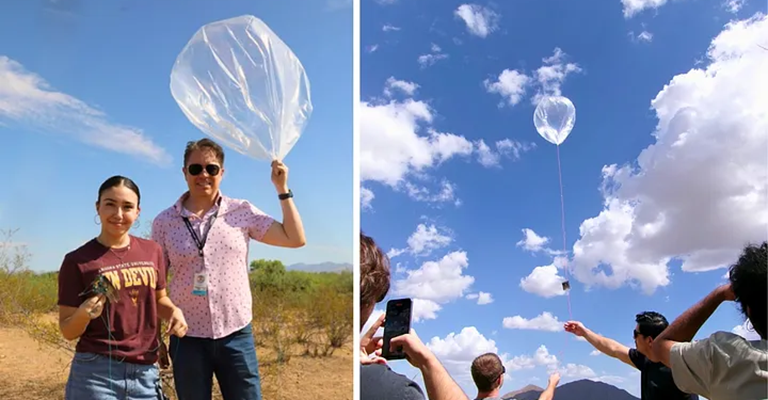About
How can we make stratospheric research more accessible?
The Interplanetary Laboratory is advancing pico balloon technology for stratospheric research and applications. These lightweight balloons, made of Mylar film and filled with hydrogen or helium, can reach altitudes of up to 60,000 feet.
Capabilities
- Long-duration flights, often circumnavigating the globe.
- Solar-powered radio transmitters for data transmission.
- Potential for scientific, economic and security applications.
Technical challenges
- Minimizing payload weight.
- Maintaining desired altitude.
- Transmitting data over low-bandwidth links.
Partnerships
- OWL Integrations: Developing long-distance communication using LoRa protocol.
- ASU’s Low Frequency Cosmology Lab: Exploring remote radio interference measurements.
Primary objectives
- Demonstrate innovative communication technologies.
- Enable non-line-of-sight communication via high-altitude intermediaries.
- Advance climate monitoring, disaster response and global connectivity efforts.
By focusing on affordable and sustainable stratospheric research, this project aims to address pressing societal challenges through the development of pico balloon technology.
Status
Past
Category
Technology development and demonstration
Environment
Earth
Contact
Key accomplishments
- Pico balloon successfully launched in August 2024, with ASU student Ysabella McAuliffe serving as project manager.
- Data successfully downlinked to the Interplanetary Lab’s ground station.
- Project incorporated into the curriculum of IPI441: Advanced Designing and Making for an Interplanetary Future.
News

Small but Mighty: Pico Balloon Radio Testing at Arizona State University
October 30, 2024 | Ysabella McAuliffe
Interplanetary Lab student Ysabella McAuliffe describes her project deploying and communicating with weather balloons.

Long duration ballooning can have many practical uses for science, economic and security purposes. … HAM radio and radio propagation methods were completely foreign topics to me, but getting to do this project has widened my knowledge and perspective of how I can apply radio to different types of projects. Having an extensive knowledge on radio communications is extremely valuable when dealing with spacecraft of any kind.
Explore more projects
Learn about our research programs dedicated to creating a future in space that prioritizes people and environments. Collaborate with experts and students to explore groundbreaking ideas and solutions that drive positive change.